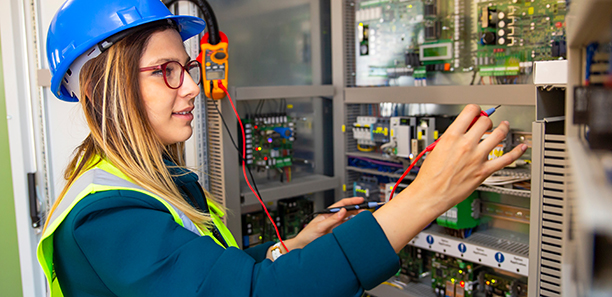
The Australian electrotechnology industry involves the design, maintenance, installation and repair of electrical equipment. Many industries, including the mining, manufacturing, ICT and communication, construction, and refrigeration industries, rely on these specific skill sets to meet the demands of an ever-modernising world.
In this article, we’re exploring the skill shortages in electrotechnology in Australia and how we can combat this problem with high-quality educational services.
The Main Industry Sectors in Electrotechnology
The electrotechnology industry is made up of six main subsectors, including electrical services (electricians), electrical engineering, industrial control, electronics and computers, refrigeration and air-conditioning, and renewable and sustainable energy (solar).
The electrical services subsector is responsible for electrical wiring and fittings in construction projects. Electricians also repair and maintain electrical equipment and fixtures that are already in place.
The top-five occupations in electrotechnology that currently have a skills shortage and are in high demand are:
- Electricians
- Electronics trade workers
- Air conditioning and refrigeration mechanics
- Electrical engineering draftspersons and technicians
- Telecommunications trades workers
Another area of concern for this industry is the number of qualified people who are working as educators, trainers and assessors for the future generation of electrotechnology workers.
Why Are We Experiencing a Skills Shortage?
The reasoning behind this skills shortage comes down to an ageing workforce where many of the current staff members are retiring. The cost and time required to achieve the necessary qualifications seem to be turning away future students; however, the changes to the cost of TAFE programs in Australia are solving these issues. Victoria now benefits from free TAFE courses in high-demand sectors, so there’s never been a better time to study.
Challenges and Opportunities in the Industry
Technological advancements, empowered consumers, the focus on solar energy and sustainability, and hazard awareness is creating newfound challenges and opportunities for the future skilling of the electrotechnology workforce.
Key areas of the industry that are currently experiencing change include the growing reliance on automation and smart systems in security, lighting, heating and cooling, and camera systems. These integrated technologies are allowing consumers to control and reduce their energy costs and consumption with more efficient systems. The demand for new skills on electrotechnology workers is changing how we educate the future workforce.
Another aspect of the industry under high demand is solar and renewable energy. Nearly two million homes in Australia already have solar panels installed and that number is expected to double in the next decade. There is a shortage of electricians with the necessary skills to install and maintain solar systems, and the number of jobs in this subsector is increasing rapidly.
As per the Paris Climate Agreement, Australia has committed to reducing emissions and phasing-out the use of hydrofluorocarbons (HFCs). This presents new skilling challenges to the refrigeration and air conditioning subsectors, requiring additional training and upskilling of future and current employees.
Combating the Skills Shortage with Education
There are three courses available at TAFE Gippsland that are dedicated to training and upskilling workers in the electrotechnology industry:
- Certificate II in Electrotechnology
- Certificate III in Electrotechnology Electrician (Apprenticeship)
- Course in New Energy Technology Systems
Regardless of your current skill level, these qualifications are designed to meet the needs of the changing electrotechnology industry in the future. You’ll also master in-demand skills such as communication, problem-solving, preventative maintenance, troubleshooting, and attention to detail. Find out more by contacting TAFE Gippsland on 1300 133 717 or sending us a message online.